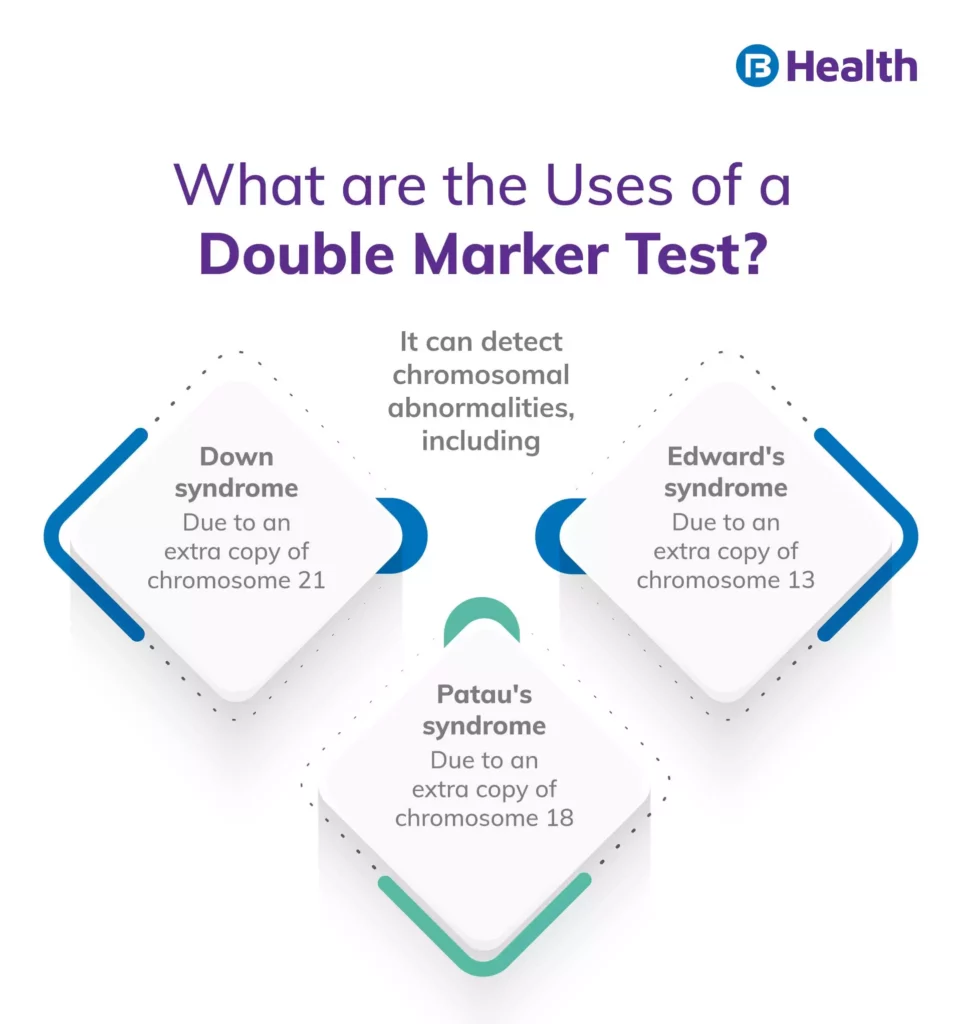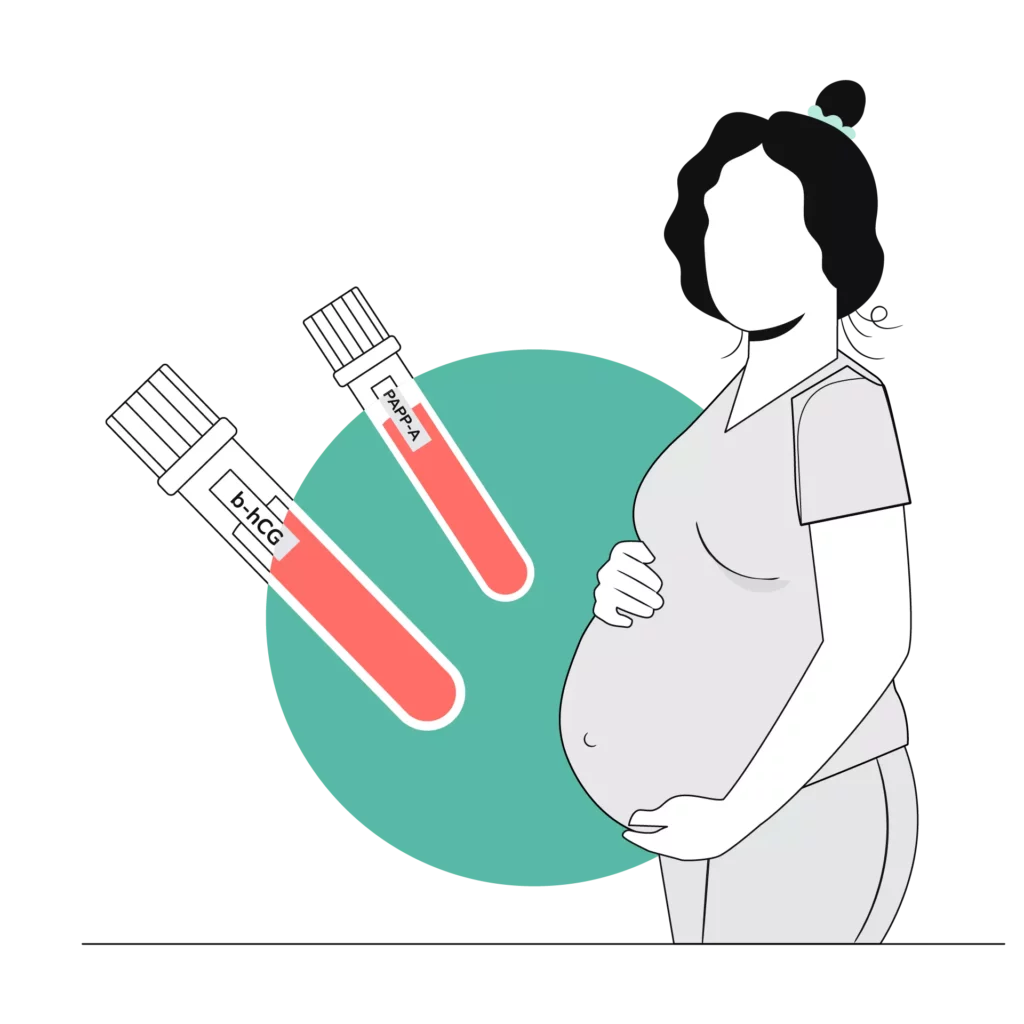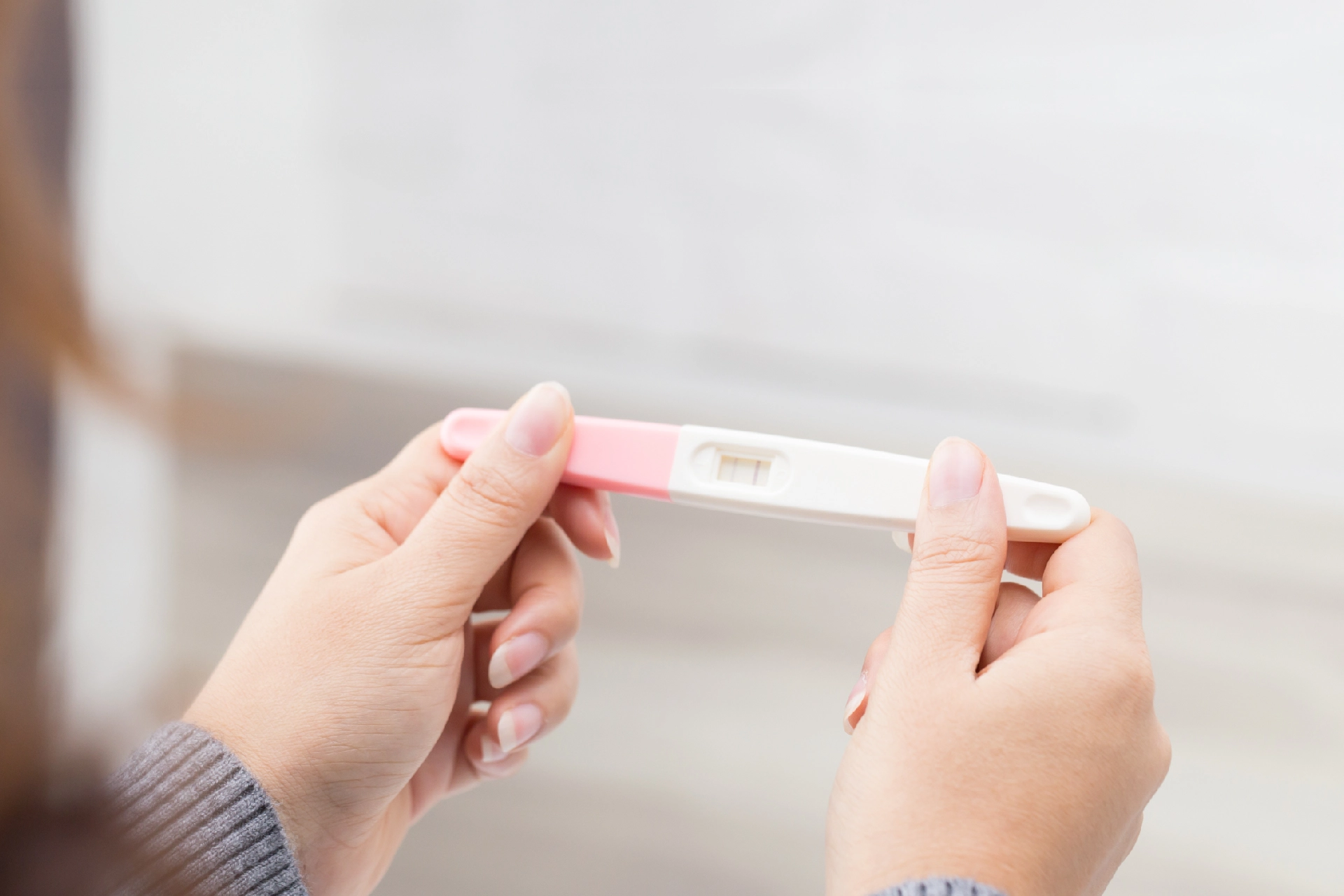Women's Health | 6 min read
Double (Dual) Marker Test: Benefits, Preparation, and Normal Range
Medically reviewed by
Table of Content
Synopsis
The double marker test or maternal serum screening is a safe and reliable way to detect chromosomal abnormalities in an unborn child. Expectant parents can use this information to make informed decisions about their prenatal care. It also helps parents understand the potential health risks their child may face.
Key Takeaways
- The double marker test is a non-invasive prenatal screening test that measures two blood markers in the foetus
- It is often carried out between 8 and 14 weeks into the first trimester of pregnancy
- The double marker test predicts the occurrence of conditions like Down and Edward syndrome
As an expectant parent, there's nothing quite as exciting as anticipating the arrival of your little one. However, with this excitement often comes a wave of concerns about your baby's health. The double marker test has made it possible to detect potential health issues in the womb.
In this article, we'll dive into the details of the double marker test in pregnancy, including its benefits and cost, to help ease your worries and ensure the best possible outcome for your baby.
What is a Double Marker Test?
The double marker test is a prenatal screening test that measures two blood markers to identify the risks of genetic disorders in the fetus. Chromosomal anomalies can result in serious illnesses and disorders that might impair a child's development during pregnancy or later in life. This test enables one to foresee the presence or potential occurrence of conditions like Down syndrome, Edward syndrome, etc.
Markers
The Double Marker Test means checking blood levels of pregnancy-associated plasma protein A and free beta-human chorionic gonadotrophin (beta-hCG) (PAPP-A). Certain chromosomal anomalies can cause PAPP-A and HCG levels to be either lower or higher than "normal" in pregnancies. [1] Along with blood PAPP-A and hCG levels, an (NT) nuchal translucency scan is performed as a part of this test. This involves an ultrasound examining the transparent tissue at the back of your baby's neck and the blood test.
Timing for the test
The Double Marker Test in pregnancy is often carried out between 8 and 14 weeks into the first trimester. However, the Test is specifically advised for women over 35, who are advised to take the test because of their increased risk of giving birth to children with deformities. [2] Younger women with a family history of congenital problems should also take the test.
Additional Read: Antinuclear Antibodies Blood Test
Double Marker Test Preparation
The dual marker test is valid for gestations of 9 to 13 weeks. Simple blood testing is used for the test. Your doctor will issue you with a prescription to take to a lab. The following preparations should be in place:
- You can eat and drink normally before your visit unless otherwise instructed because it is a non-fasting test
- You must inform the doctor if you took any medications before the test
- At the time of your test, please have a hard copy of your most recent pregnancy ultrasound report (NT/NB, CRL or Level 1) and your maternal screening information (LMP, DOB, weight, diabetic status, and IVF) available
- Provide the mother's date of birth (dd/mm/yy); the last day of her period; an ultrasound; and the number of fetuses' (single or twins); Diabetes status, body weight in kilograms, IVF, smoking, and prior history of pregnancy with trisomy 21 were all present at the time the sample was collected
You can also book an online doctor consultation to learn more about how you can prepare for this test.
What Are the Uses of Dual Marker Test?
In a typical pregnancy, male or female fetuses will have 22 pairs of XX chromosomes or 22 pairs of XY chromosomes. An additional chromosome is present in a person with a trisomy. The test can detect these conditions, including the following:
- Down syndrome: Due to the extra copy of chromosome 21, this common trisomy is also known as trisomy 21. It can result in heart problems, mental health issues, and other illnesses that impact important organs [3]
- Trisomy 13 and 18: A second copy of either chromosome 18 (Edward's syndrome) or chromosome 13 (Patau's syndrome) is present in these typical chromosomal abnormalities [4]
Benefits
The double marker test provides peace of mind for expectant parents and can help ensure their child's best possible health outcomes. Here are some more Double Marker Test benefits:- Early detection of genetic disorders can help parents prepare for the birth of their child and make informed decisions about their prenatal care
- The test is a safe and reliable way to screen for genetic disorders and poses no risk to the mother or fetus
- The test has a high accuracy rate, providing reliable results that can help parents plan for their child’s treatment
Procedure
A Double Marker Test procedure includes an ultrasound examination and blood testing. Beta HCG, or human chorionic gonadotropin, and PAPP-A, or pregnancy-associated plasma protein, are the principal indicators.
The blood test is read with an ultrasound test called a nuchal translucency (NT) scan, which looks at the baby's transparent neck tissue at the rear. Human chorionic gonadotrophin (hCG) and Free Beta and PAPP-A are the two indicators that the test focuses on.
You can easily book online lab tests, and our medical team will come on the day and time you choose to take a blood sample in the most hygienic manner possible while adhering to established guidelines.
Double Marker Test: Normal Range
- The test results are either low, moderate or high-risk, and each denotes the likelihood that the baby may have chromosomal abnormalities
- The double marker test normal values for PAPP-A are 1 MoM (multiples of median) for the woman of all ages
- The normal range for HCG (human chorionic gonadotropin) is 25,700-288,000 mIU/mL
How Much It Cost?
The cost of the test will vary depending on your location and insurance coverage. Even though the test is voluntary, your health insurance plan might pay for it.
Depending on the city and hospital, a Double Marker Test will cost differently. It would cost between Rs. 1000 and Rs. 5000 for the exam. This test typically costs around Rs. 2500 in several places. You must pay for both tests for the full first-trimester screening because this test is typically performed with the NT scan.
A double marker test is a safe and non-invasive screening test for the unborn baby. This test helps prepare the parents if the baby is born with special needs. A healthcare professional or genetic counsellor can work with you to determine if the test is needed and guide you accordingly. To know more about the double marker test, visit Bajaj Finserv Health and speak to a doctor from your home.

FAQs
What chromosomal abnormalities can the double marker test detect?
The double marker test can detect Down syndrome, Trisomy 13 and Trisomy 18.
What role does ultrasound play in the dual marker test?
Before recommending the Dual marker test, the doctor would typically recommend an ultrasound. The Dual Marker Test is suggested based on the ultrasound test results.
When is the double marker test administered?
The double marker test can only be conducted within a rather limited time span. Your doctor will ask you to schedule an appointment for a period that may be extremely early in the second trimester or near the end of your first trimester. Your blood will be taken particularly somewhere between weeks 11 and 14.
Does the double marker test carry any risks?
The test has no danger attached to it. However, because the blood sample collection for this test requires a needle, a patient may rarely develop increased bleeding, hematoma (blood collection under the skin), bruising, or infection at the needle prick site.
How soon can we anticipate the test results?
Generally, it takes three days to 1 week to get your results. You can also call and ask your clinic to get your findings or confirm the result date.
References
- https://www.ncbi.nlm.nih.gov/pmc/articles/PMC3547446/#:~:text=The%20markers%20used%20for%20the,increased%20risk%20of%20Down%20syndrome.
- https://www.ncbi.nlm.nih.gov/pmc/articles/PMC3111043/
- https://www.cdc.gov/ncbddd/birthdefects/downsyndrome.html#:~:text='%20Down%20syndrome%20is%20also%20referred,physical%20challenges%20for%20the%20baby.
- https://www.ncbi.nlm.nih.gov/pmc/articles/PMC3991414/
Disclaimer
Please note that this article is solely meant for informational purposes and Bajaj Finserv Health Limited (“BFHL”) does not shoulder any responsibility of the views/advice/information expressed/given by the writer/reviewer/originator. This article should not be considered as a substitute for any medical advice, diagnosis or treatment. Always consult with your trusted physician/qualified healthcare professional to evaluate your medical condition. The above article has been reviewed by a qualified doctor and BFHL is not responsible for any damages for any information or services provided by any third party.
